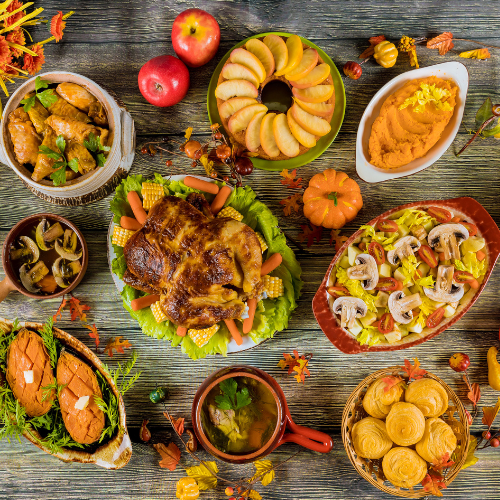Navigating Food Holidays Without Losing Your Balance
The months from mid-September through December are a whirlwind of food-centered events. From Rosh Hashanah gatherings and their sweet symbolic foods, to tailgates and Halloween candy bowls, Thanksgiving feasts, Christmas cookie swaps, and New Year’s celebrations — it can feel like one long stretch of eating occasions.
For many people, these traditions bring joy, nostalgia, and connection. But for others, the season can be incredibly triggering. Sometimes it’s the foods themselves — the endless trays of desserts, once-a-year dishes, and drinks that can spark feelings of being out of control or weighed down by guilt. For others, it’s not about the food at all, but the people sitting across the table. Holiday gatherings bring together family and friends who may not see us often, and with them can come comments or questions we didn’t ask for: “Are you really going to eat that?” “You’ve lost weight!” “I made this just for you, why aren’t you eating it?” Even well-meaning words can feel sharp, pulling us out of the moment and back into self-consciousness.
It doesn’t help that the cultural messages around this time of year are so contradictory. On one hand, we’re told to indulge, to bake the perfect pie, to celebrate with abundance. On the other hand, we’re warned not to “ruin our progress” or to make sure we’re “being good.” It’s no wonder the holidays can leave us feeling like we’re failing no matter what choice we make.
So what can we do? We can’t control every casserole that lands on the table, or every relative’s comment, but we can begin to reframe how we experience these months. One way is to anchor in your “why.” Before walking into a gathering, pause and ask yourself: why am I here? Maybe it’s to connect with family you don’t often see, to celebrate traditions that matter to you, or simply to enjoy food you don’t eat every day. Remembering the deeper purpose can soften the focus from how much pie you eat (it’s okay, eat the pie!), and center it instead on whether you showed up in a way that feels aligned with your values.
Another shift is to reframe how we see the foods themselves. Instead of labeling them as good or bad, what if we thought of them as seasonal? Pumpkin pie, cranberry sauce, peppermint bark — these aren’t everyday staples, and that’s part of what makes them meaningful. Eating them doesn’t have to be about “cheating” or “making up for it later.” It can simply be about savoring a flavor that connects you to a season, a story, or a memory.
Planning for support can also help. If you know family dynamics are tough, think about who feels like a safe ally in the room. Maybe you sit next to them at dinner, or slip away together for a walk. If that’s not an option, find small grounding rituals you can lean on. Step outside for a few breaths of fresh air, excuse yourself to the bathroom to check in with your body, or keep a calming phrase ready. Sometimes just a moment of pause is enough to reset.
Boundaries also matter. You don’t have to accept every comment about your plate, your body, or your choices. A simple subject change — “I’d love to hear about your new project” — can redirect the conversation. A gentle, “Thanks, but I’m full,” is more than enough. Setting boundaries doesn’t mean being confrontational; it means protecting your own peace.
And sometimes, shifting the holidays means creating or expanding traditions. Maybe you bring a dish you know will feel accessible to you, even if the rest of the table looks different. Maybe you start a smaller gathering with a friend or two where the menu reflects foods you all love. Maybe you take the spotlight off food entirely by introducing a game, organizing a photo swap, or asking an elder to share a family story. When the holiday experience widens beyond what’s on the plate, the pressure of food loses some of its sting.
Through it all, a few gentle reminders can help carry you. You don’t need to earn your food with exercise or restriction. You are allowed to eat foods you enjoy, and you’re not obligated to eat anything you don’t want, even if someone made it with love. Your worth is never measured by what’s on your plate, and connection — not perfection — is the main course.
Food holidays will always be layered. They hold joy and comfort, but also carry complicated histories, emotions, and expectations. You can’t change every dynamic or every dish, but you can choose how you care for yourself in the midst of them. You can give yourself permission to be present, to protect your needs, and to shape new traditions that feel safe and meaningful.
As we head into the coming months, may you find moments of joy at the table, space to breathe when things feel heavy, and the reminder that your needs belong there too. Because these holidays aren’t just about food. They’re about belonging. And you deserve to belong, exactly as you are.

